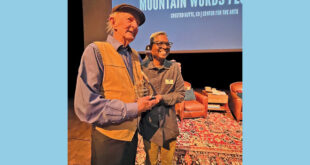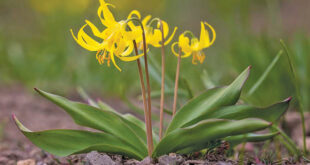Finding a groove with the Crested Butte School Band
“Let’s use our ears instead of the machine, because it’s run out of batteries,” Amanda Cook directs her Crested Butte Community School band students, signaling to one of the horns who gives the note for everyone to tune to.
Progressing through the chairs, from French horns and bass clarinets to flutes and piccolos, the dulcet notes seem to float and hang on the air. It takes a lot to tune a small concert band of enthusiastic young musicians. They listen to their instruments, focus on their individual sound above the clamor of the rest, and miraculously adjust.
“Take a breath… ready?” Amanda’s expressive hands are already lifted, ready to coax music from thin air. The trumpets are in another room practicing their solo as the rest of the band cranks up a sleigh bell song reminiscent of klezmer.
The kids call her “Cool T,” an indisputable title for the teacher. After the song is finished, the group breaks out in a cacophony of laughs and loud discussion over the chaos of some who are playing random pieces of songs between the shuffling of music charts. One of the percussionists grabs a cowbell and sits down next to the maestro, who holds a finger upward to the heavens—one by one, each of the students follows suit, signaling that it’s time for quiet and undivided attention. The clan of trumpeters blows into the scene from next door, lips pursed and cowbell poised, the band breaks out into a rendition of Louie Louie. “Listen to the saxophone!” she encourages everyone, and it all falls into place as Cool T’s hands dance in another language from the podium, calling out for sharper Bs, softer tones and then crescendo.
There’s an undeniable camaraderie amongst the group, which is not uncommon for young musicians. A Columbia University study concerning music programs in schools found that participating students connect to each other better and there were fewer fights, less racism and even less hurtful sarcasm. Skills acquired through music classes enhance discipline, analytical problem solving, better communication skills and cooperation in everyday life.
There is a confluence of intellect and music—the study also revealed that the effects of music lessons on academic performance and cognitive abilities showed statistically higher intelligence quotients. Music students are more self-confident and better able to express their ideas, and a large percentage of them said their music participation motivated them to stay in school and helped them cultivate a broader cultural respect across the boundaries of ethnicity and age. Many new studies emerging suggest that learning to play a musical instrument as a child may help keep the mind sharp and combat the aging effects on the brain even decades after the child put down their instrument and never played again.
At CBCS, band is mandatory for all fifth graders but afterwards students may choose it as an elective. An impressive 60 percent of them continue band as sixth graders. “Kids come in thinking they can’t play,” Amanda cites, “They somehow assume that because they haven’t played before, or been exposed to learning an instrument before, that they won’t succeed. Giving them the basic knowledge of music and some direction and positive attitude is all they need. I see them blossom.”
Amanda likes to use a different quote from one of her students during each concert. “My favorite quote is, ‘I thought I sucked until I practiced.’ I was like ‘DUH,’” she laughs. “It was like a light bulb that went off in this kid’s head after he did what I told him to do.”
Concerning the music she chooses, Amanda explains, “I have a very limited budget to work with so I typically buy a few new pieces each year and then use pieces from our band music library. I like them to work on a variety of styles, chorales, movie music, fun dance music, popular songs, marches, classical, etc. For example, we play everything from Michael Jackson and the Black Eyed Peas to John Phillip Sousa and George Gershwin.”
The kids themselves express an interest in everything from rap to classical to rock. Their exuberance for their art is founded in various goals from wanting to be a rock star, wanting to get paid for playing, to a feeling that compares to nothing else when they play their instruments. ”It’s like being in my own world,” one young student related. Many also expressed that if they’re having a bad day, coming into class and being able to play helped dispel those negative feelings. All of them agreed it helped them concentrate in other disciplines and academia.
This is Amanda’s fifth year teaching band at CBCS. With a master’s degree in percussion performance from San Francisco Conservatory of Music, Amanda is a percussionist and pianist at heart. “I try to teach from the angle of performance.” She was actively performing with the Santa Cruz Symphony Orchestra until fairly recently.
Amanda feels performance is a vital part of her students’ experience and every May they trek to compete as a band in Denver. They’re up against far bigger middle school ensembles. “We’ve got 20 kids, they have 80. The fact that they’re competing against larger schools is a real motivator,” she says, adding with a smile, “and we get to go to Elitch’s.”
She also thinks it’s important for the kids to have an audience other than their family and close friends to add to the real experience of performing. “I see some of them for four years so they don’t get nervous in front of me! I want them to feel self-confident and have self esteem in their abilities. Some of them will go on in music professionally and I want to give them what it takes to go on. It doesn’t just take a dream—you have to act on that dream.”
(The CBCS Band concert is Wednesday, December 19 at 6 p.m. in the Multi-Purpose Room at school. The band will play a variety of holiday music and the community is invited to attend.)
 The Crested Butte News Serving the Gunnison Valley since 1999
The Crested Butte News Serving the Gunnison Valley since 1999




